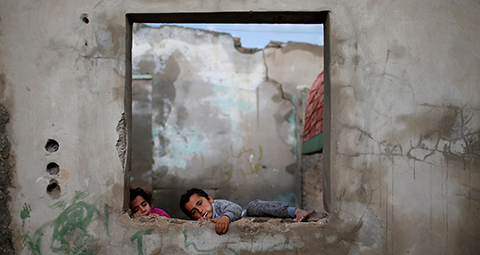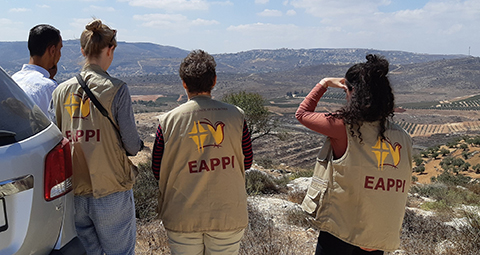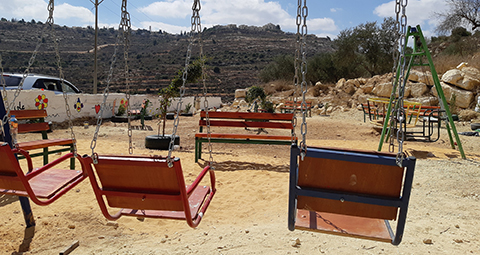November 2 | ![]() 0 COMMENTS
0 COMMENTS ![]() print
print

Welcome to the occupation: the children forced to flee gunfire in the West Bank
Edinburgh parishioner Philippa Bonella is spending three months in the occupied West Bank as a human rights monitor. In her first dispatch, she looks at the children caught up in conflict.
Just outside Qaryut, a village near Nablus, there is a spring that once provided the villagers with water. But since deep wells were sunk at the surrounding settlements of Eli and Shiloh, it no longer offers enough.
The villagers now have to buy their water from the settlements; it is shipped to their houses in tankers. Even though the spring is less productive, Israeli settlers have tried to restrict the villagers’ access to it, often bringing their families onto village land to claim it for themselves.
Settlements are communities of Israelis within the occupied West Bank. They are illegal under international law: article 49 of the Fourth Geneva Convention prohibits occupying powers from transferring their own civilian population into occupied territory. It is estimated that there are almost 600,000 Israeli settlers living in 200 settlements in the West Bank, including East Jerusalem.
The villagers of Qaryut are working hard to peacefully retain their spring and the land around it. Left with only a third of their land due to settlement expansion, they are trying to retain a sense of normality for the community, and especially for their children.
With help from an international charity they have built a beautiful new children’s playground, to encourage local Palestinian families to visit the spot regularly and maintain their claim to the land. Above the playground, you see the settlement houses of Shiloh, with kennels for guard dogs (which act as a canine ‘fence’) regularly spaced along the settlement boundary.
Last week I visited the village to hear about a recent incident. Five Palestinian boys aged between eight and ten were playing together in the early evening when Israeli soldiers and the settlement security chief arrived near the playground. No one knows why, but live ammunition was fired and three of the boys were arrested and taken up to the settlement.
Hearing gunfire, the villagers raced to the scene and were able to get the arrested boys released at the settlement entrance.
The other two had run into the hills and were nowhere to be found—one returned home late that night and the other was found the next day after an extensive search, trembling and hiding in a cave.
“He would only come out when he heard his father’s voice,” explained our local contact, Bashar. “[The settlers] tell us we are teaching our boys to hate, but actually it’s the life that does that.”
After the incident, the villagers were warned by the Israeli army commander that they should stop visiting the playground. But they refuse to compromise on the right of their children to play in peace.
“Now we are going to the playground every day together,” Bashar said.
Article 27 of the Fourth Geneva Convention requires humane treatment of occupied civilian populations, and specifically says they ‘shall be protected especially against all acts of violence or threats thereof.’
On that Wednesday afternoon, in that children’s playground, these expectations were broken. As the villagers say when they try to explain these things to me, ‘Welcome to the occupation.’
– Philippa Bonella is in the West Bank as part of the World Council of Churches’ Ecumenical Accompaniment Programme in Palestine and Israel.












